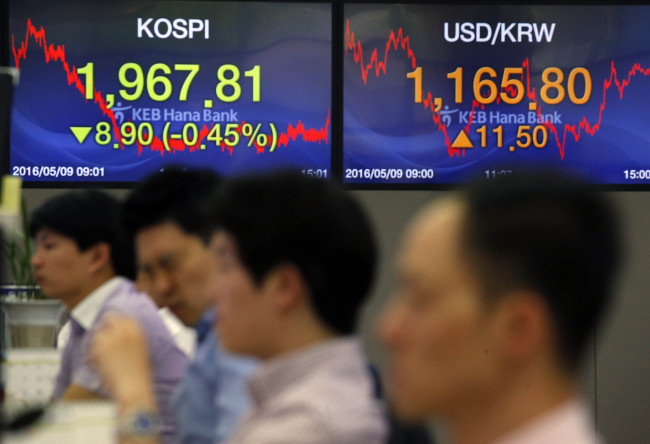South Korea's stock market is expected to tread on thin ice for the next week on escalating concerns over Britain's exit from the European Union, analysts said Tuesday.
A yes vote for a British exit from the economic bloc, called Brexit, could prompt foreign investors, especially those from Britain, flee South Korea in droves, resulting in a big drag on the local bourse, they added.

Britain will hold a referendum on June 23 to decide if it will remain in or leave the EU. Market sources say recent polls show a swing toward a vote for Brexit.
According to a survey of 2,000 Britons conducted last week for the British newspaper Independent, 55 percent believe London should leave the EU, while 45 percent want it to stay.
Two other polls released over the weekend showed that British public opinion is too close to call on whether the country should maintain its EU membership, with many voters still undecided ahead of the referendum.
Brexit worries, combined with a flight to safety ahead of the Federal Reserve meeting slated this week, sent South Korean stocks tumbling nearly 2 percent to a two-week low on Monday.
Analysts said the South Korean stock market is likely to seesaw until the vote, depending on the results of the polls.
"For the time being, the local bourse will inevitably go up and down, hinging on the outcomes of public surveys on Brexit," said Lee Sang-jae, a researcher at Eugene Investment & Securities Co.
Han Yo-seop, an analyst at Mirae Asset Daewoo Securities Co., echoed the view. "Market woes over Brexit will likely peak just before and after the British referendum, and then will ease."
Market watchers said a yes vote for Brexit could have far-reaching repercussions on the global financial market as well as the South Korean bourse.
"A decision to leave the EU would deal a harsh blow to the British economy, lead to a repeat of a financial crisis in southern European countries and prompt other members to leave," said Paik Chan-kyu, an analyst at KB Investment & Securities Co. "It could also have a big impact on the U.S. presidential election."
In addition, it may trigger a flight to quality in the global financial markets by making the pound and the euro weaker and strengthening the U.S. dollar, he added.
"A Brexit would likely be more shocking to emerging markets than advanced economies by prompting offshore investors to pull out of those markets," Paik said.
Lee Kyung-min, a researcher at Daishin Securities Co., said British and other foreign investors could flee the South Korean stock market if Britons vote for an exit.
"A Brexit could come as a burden to the bourse because a considerable amount of British funds has been invested in local stocks this year," he said.
Currently, British investors hold 36.5 trillion won ($31.1 billion) worth of South Korean shares, which accounts for 8.4 percent of total foreign stock ownership.
Kim Dae-jun, a researcher at Korea Investment & Securities Co., expressed a similar view. "American and British investors may net sell shares due to stronger risk aversion. In particular, the outflow of British funds will likely be considerable and last long."
Some experts, however, struck a cautious note, saying there is no need to overreact to Brexit concerns. "There is a low possibility of Britain leaving the Euro, given the number of swing voters," said Kim Yong-koo, an analyst at Hana Financial Investment Co. "Investors don't have to be overwhelmed by the Brexit issue." (Yonhap)








